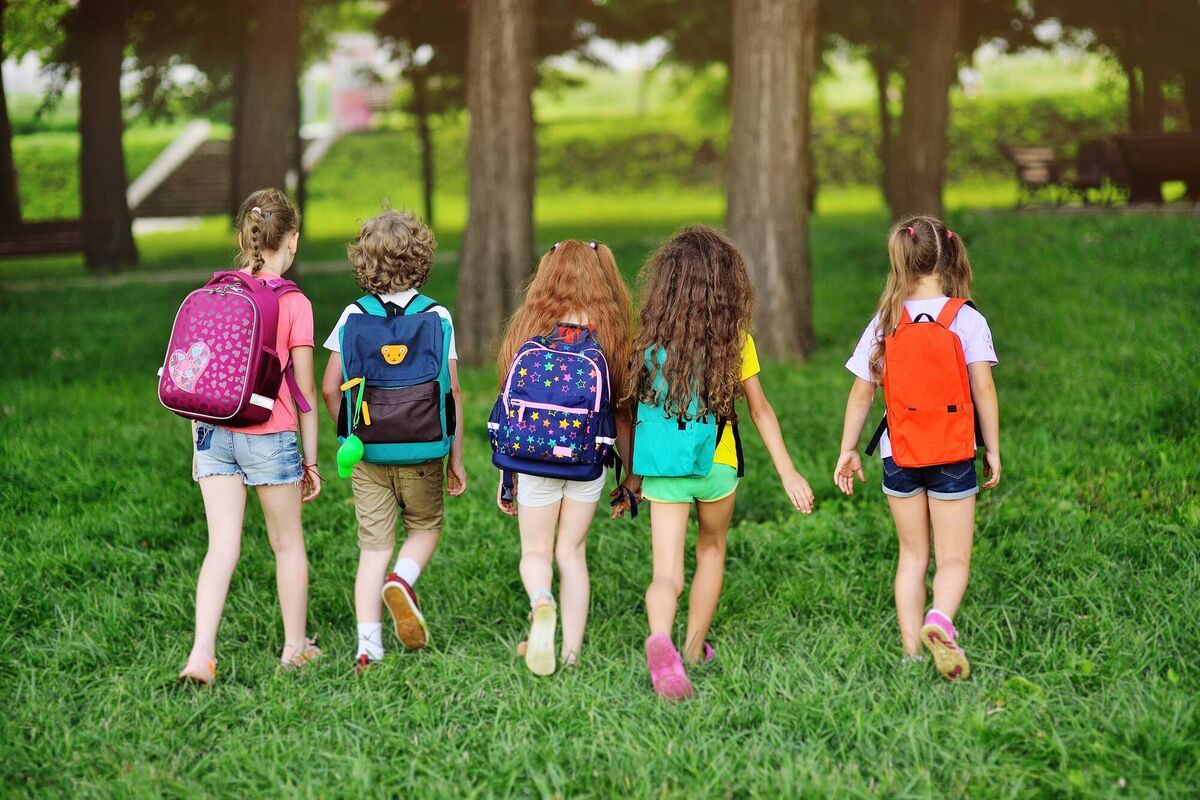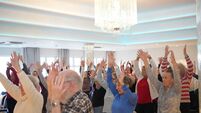Key tips to help navigate the return to school

School kids all over the country return to school this week. Picture: Stock
PREPARATION IS KEY
The number one piece of advice I would give to parents as they support their children to return to school is to do as much preparation in advance as possible.
This could involve laying out uniforms and shoes, packing bags, preparing lunches, setting the breakfast table, even ensuring the car keys are in the right place. It all means that things will run much more smoothly in the morning. Uplifting and energising music can really help to boost the mood on school mornings too.
Not only will this mean less stress for everyone, it also means you can focus on being emotionally available for your children so that you can support them through the excitement and nerves of going back to school.
Think about what has made school mornings stressful in the past and do what you can to reduce or eliminate these stressors for the coming year. To help you, I’ve created a free resource called ‘StressFree School Mornings’ available on my website www.catherinehallissey.com
If your child struggles to separate from you for school, please remember that some kids separate with ease and for others, separation always includes tears - it’s part of their story but not the whole story. It’s not that you or they are doing something wrong, it’s just part of their story.
And, most important of all, please know that all your children really need is you - perfectly imperfect you - emotionally available and interested in their lives. As humans, we have an in-built system for developing resilience. When we are stressed or frightened, our attachment system gets activated, causing us to seek out our parent or caregiver. If the caregiver is emotionally available for us at that time, we feel safer and more secure, which builds resilience - everything else is icing on the cake.
Catherine Hallissey is a renowned psychologist. See www.catherinehallissey.com
LET THEM TAKE RESPONSIBILITY
Encourage kids to take responsibility: Help your kids to get organised themselves (age appropriate of course). All kids are well able to have their school bags ready the night before, older kids can make their own lunches, have uniforms ready, PE gear, etc. If you keep doing these things for them, how will they ever be able to do them for themselves?
It is our job as parents to teach our kids to take responsibility for themselves, of course we will help them (especially the younger ones) but in my experience they are capable of so much more than we think. Start as you mean to go on with this one, if you hand over some of the responsibilities to them, you may be surprised at how well they can manage themselves.
Have fun with it: Try to have a little fun getting ready for ‘back to school’. Let the kids pick out their own pens, school bags and other school necessities - yes, the shopping may take a little longer but it will add a little more fun to the experience.
Kids pick up on our every word and action - try to speak positively about school (even if you don’t feel positive). It is so important not to pass on our anxiety to our kids. Very often the parent is a lot more nervous than the child so do keep an eye on your own attitude as they are always learning from you.
Eileen Keane Haly, director of JumpStartYourConfidence and author of The Parent.
See jumpstartyourconfidence.com - Facebook
KEEP IT GENTLE
My one piece of advice as a teacher is the same piece of advice I give my children every morning before they head off to school. It comes in two parts:
1. Be kind 2. Try your best.
I met an interesting teacher this summer who reminded me to add ‘and expect kindness too.’ It’s a great addition. I certainly don’t want my students, or my children, to feel they are anything but deserving of kindness from others.
A gentle return to school is important for young people. As a secondary school teacher, I see how pained they look every morning, having to get up so early, and the first day back after a long, lazy summer comes with a very particular sting. Keeping it gentle is key.
I’m certainly not one for listing out rules on the first day. But I mention trying your best, respect, kindness. It’s all very simple really.
School is a social place and how young people interact with their peers and teachers is a huge part of their education – the most important part. The social and emotional aspect of education should always come first. I always thank my students at the end of a lesson, and I expect them to thank me too.
No teacher can ask a student to do more than try their best. I want my students to take pride in their work, to know that it matters because it’s a contribution they’re making to the world beyond themselves. Trying their best includes things like turning up with a pen and paper, being on time, and listening to feedback.
Beyond my two requests, I hope my students feel happy in their own skin, and beneath their stark, early-morning shock, are happy to be back. I also hope there’s biscuits in the staffroom but that’s a whole other article.
Cork secondary school teacher, Jennifer Horgan

RELAX, LISTEN AND CHAT
As a parent of three school-going children, there’s no denying that the return to school transition can bring with it a rollercoaster of emotions and an injection of pace that can at times be overwhelming.
These days are often characterised by forensic focus on our never-ending ‘to do’ list as we wonder if we have ‘everything sorted’. As if, somehow, reassuring ourselves that if our children have all the material items that they need, they will be fine… right?
When we strive for perfection in this regard, we can often lose sight of what is most important at this time – connection with our children and compassion for ourselves.
For a lot of children, returning to school can be an anxious time, particularly for those changing schools or transitioning from primary to secondary school. It can represent a change in identity and status for them.
Having a parent/guardian who has a calm presence is important in enabling them to navigate this transition.
This involves taking time out to relax, listen and chat as well as provide reassurance and encouragement. All of this is invaluable to our children.
Of course, it’s very hard to be ‘present’ if we are running from pillar to post. In my coaching practise, I have observed that while many adults are compassionate towards others, they are at a loss when it comes to themselves. It is my belief that the most important relationship we have in our life is the one we have with ourselves. Therefore, our route to self-compassion may involve practising kindness by not judging ourselves harshly, aiming to remove the word ‘should’ from our narrative, and by backing ourselves. As with every other September “This too will pass”.
Gillian McGrath is a Life & Business Coach. See www.changegrowsucceed.com
AVOID UNREALISTIC EXPECTATIONS
Don’t panic and don’t feel guilty. It is very easy to have an image of what a perfect back-to-school should look like, with everything neatly packed and labelled - ideally since June. In your head you might think you’re going to be on the ball with everything this year, you might have googled 25 healthy lunch box ideas your kids will love and pinned them all, you might have certain expectations about how organised you should be and how smoothly things should run. And it’s very easy then to feel you’re failing if this doesn’t materialise. Or, rather, when it doesn’t.
Because in reality these expectations are almost always unrealistic. And we forget to take into account how much work it all actually is. We talk a lot about the cost of going back to school, which obviously is a real concern. But I don’t think we talk enough about the time and energy it takes. The many trips to book and uniform shops.
Tallying up what you have and what you don’t have from last year. Uniforms, books, stationery, lunchboxes.
Stocking up on snacks, sorting out lifts and timetables - the list goes on. Please give yourself a big pat on the back for everything you actually manage to get done. And try not to worry so much about the rest. It’s good enough.
Ingrid Seim is a psychological coach, founder of Avenues Consultancy & Coaching and Vice President of Network Cork. See https://avenues.ie/
DO SOMETHING FOR YOURSELF
The one piece of advice I have for parents as the kids return to school is to not forget about yourself. Yes, there is so much to do and anxiety might be running high for all the family, but look out for the small windows of time where you can do something for yourself, whether that’s five minute s one day or 30 minutes the next day.
Doing something for yourself will help you to cope during this busy and stressful time. Maybe it’s a quick phone call to a good friend, doing some stretching or deep breathing. If you have a lot going on in your mind, then putting it down on paper helps, such as making a to-do list for tomorrow or reflecting in a journal about something that bothered you during the day.
Ask yourself what small thing can I fit in today that will give me some energy and make me feel good?
Sinead Kelly is a Self Health Coach. See www.sineadkelly.ie
SING INTO A SCHOOL ROUTINE
Looking for a simple hack to help with the challenges of getting back into your school routine? Try music.
Yes, music. It has a powerful impact on our brains by releasing chemicals which can quickly make you feel so much better.
Whether it’s drop off/pick up - before or after school – get the children involved. Turn off the talk radio and pick a song you all like, put it on and start singing away. Incorporate fun and laughter into those struggles – packed your bag? Got your lunch? Yes, they will still be there, but take the edge off them by playing your favourite tracks in the background.
Choose musical tracks for the mood you’re trying to create – if you need to inspire everyone to do things quicker – choose upbeat and inspirational tracks. To improve bad moods and bring about calmness to the household – put on a classical track or something slow and steady.
Have fun experimenting with your family!
Sukhi Bryne, Dynamic Mind Growth, is a Mind Fitness Coach who utilises the power of the mind to help bring calmness, clarity and control back into your life
COMMUNICATION IS KEY
School staff all over the country are preparing for the return of students to the building. Summertime turns the school into an unnaturally quiet space without the full school community present. Be assured that your child will receive a warm welcome back to school.
One of the common reasons teachers chose their profession is to make a difference for young people. We are really looking forward to seeing them and hearing their stories.
The education of our students is a partnership between school, students and parents.
As a parent, you know your child’s strengths and challenges, positively affirm all they are doing well and help them to develop problem solving skills when faced with challenges.
You could use questions such as ‘what could you do?’ ‘Who could you speak to?’ If challenges arise, it does not matter how big or small, my top tip would be to communicate with the school as discussing a matter can be of great benefit to your child and a support to you as a parent also.
In post-primary school there are Class Teachers, Year Heads and members of the Student Support Team who have specific roles in supporting students. When the school, parents and students work together in partnership, there can be many benefits for all, but especially for your child. I hope the new school year brings many positive opportunities for learning for your child both academically and personally.
Edwina Gottstein is Principal of Bishopstown Community School Cork.
A HEALTHY ROUTINE
Returning to secondary school can be a challenging time for young people. The long summer holidays, with increased freedoms and more relaxed daily routines, can create a lot of anxiety and stress at the thought of returning to school. This can be especially difficult if your child is making the big transition from primary school into first year.
Young people feel safe and supported within the routines their parents put in place for them. It brings a consistency and security to what can often be a difficult first few weeks adjusting back into school life. Talking to your child about the practicalities of the day can help reassure them and allow them to feel a certain amount of control over their lives during what can be an uncertain time.
Talk about things such as, what time they need to get up in the morning, how they will get to and from school, what time they will get home, and any other routines that are relevant to them. These can sound obvious to adults but can reassure those students who might be a little anxious.
Creating this certainty in their day will initially be a struggle to adapt to, but after a few days will help both students and their families settle into a routine that will allow them to reintegrate into their busy lives of school, activities, and homework. As always, students will quickly settle back into school but will feel supported by the reliable routines in their daily lives.
Alan White is a teacher in Bishopstown Community School and Wellbeing Author.
IT WILL BECOME EASIER
My one piece of advice to parents is to remember it’s chaos in every house. No-one starts the year without feeling overwhelmed but the new routines will become easier and more manageable as we settle in. Don’t project forward too much, instead just concentrate on getting organised for each day - then eventually it will become routine.
Allow yourself to mess it up without getting annoyed. The kids will be fine. And peel the oranges for the lunch boxes before they go in - otherwise the teachers will all hate you!
Cliona O’Connor, Instagram @clionaoconnor







 App?
App?


